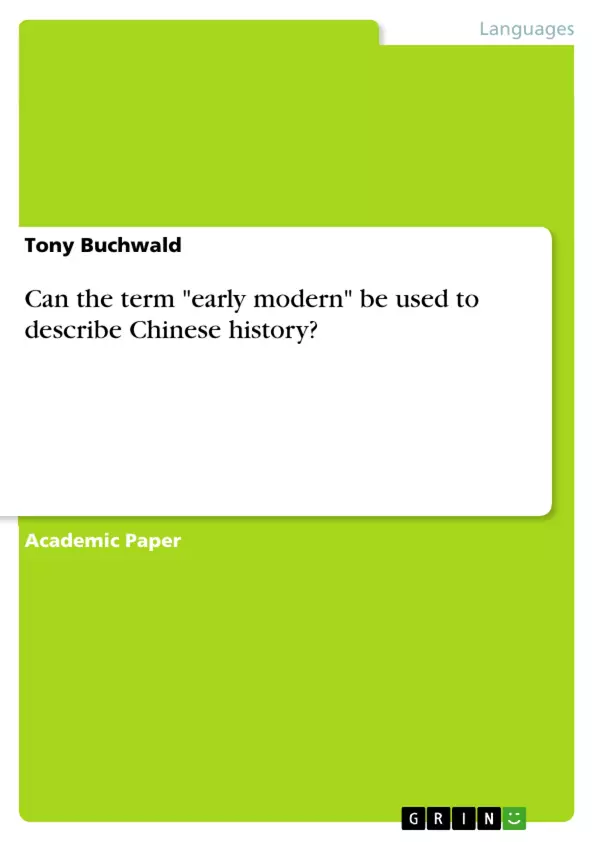“Early modernity” is a concept of ambiguity in historiographic scholarship and has been a topic for discussion for several decades. Søren Clausen discussed the term in regard to China in his paper, Early Modern China – A Preliminary Postmortem. For Clausen, the search for a terminology describing an “early modern China” emerged from the urge to incorporate China into a world history, whose importance he stresses in his introductory sentence: “A world that is increasingly becoming ‘one world’ needs a world history” . What he also did was to recap the influence other historians had on the discussion during the 1980s and 90s, which are partially also addressed in the paper.
Inhaltsverzeichnis (Table of Contents)
- Is 'early modern' a meaningless term?
- The Problem of the “Early Modern” World
- Defining 'Early Modern China'
- 'Modernity' and 'Stagnation'
- Social Mobility and 'Modernity'
- 'Modernity' and China
Zielsetzung und Themenschwerpunkte (Objectives and Key Themes)
This article examines the historical concept of "early modernity," particularly in relation to China, and argues against its usefulness as a meaningful term in non-European contexts. It explores the origins of the term, its limitations, and the challenges it presents in applying it to different societies.
- The problematic nature of applying the term "early modernity" outside of Europe
- The Eurocentric biases inherent in the concept of "early modernity"
- The challenges of defining "early modernity" in China, with different scholars focusing on different aspects of society
- The potential for misinterpretations and misunderstandings when applying the term to different cultures and historical contexts
- The need for a more nuanced understanding of "modernity" and its implications for societies outside of Europe
Zusammenfassung der Kapitel (Chapter Summaries)
- The article begins by introducing the debate surrounding the term "early modernity" and its ambiguities. It highlights John A. Goldstone's argument that the term is essentially meaningless due to its origins in Marxist historical theory and its subsequent application to diverse historical circumstances.
- The author then discusses the various societal characteristics that the term can be applied to without causing confusion, such as the emergence of market economies and proto-industry. However, he emphasizes that the term becomes problematic when used to describe a whole period of history, particularly in the case of China.
- The chapter delves into the different interpretations of "early modern China" among scholars, with various perspectives emphasizing commercialization, urbanization, commoditization of knowledge, or economic growth. The author notes that the term has been largely abandoned by leading scholars in favor of "late imperial China."
- The author further examines the concept of "modernity" and its association with "early modernity." He argues that the term implicitly suggests a trajectory toward European-style modernization, which may not be applicable to all societies. He explores the potential limitations of the term when applied to China, which may have displayed signs of "modernity" in certain areas but also experienced stagnation in others.
- The chapter concludes by discussing social mobility as a feature of "modernity" and how it has been interpreted in the context of Chinese history. The author presents Benjamin Elman's argument that social mobility in China during the Ming and Qing dynasties was largely a construct of the elite and may not have represented a true process of modernization.
Schlüsselwörter (Keywords)
The keywords in this article include "early modernity," "China," "Eurocentrism," "modernity," "social mobility," "historical colonialism," "late imperial China," and "teleological." These terms represent the central concepts explored in the analysis of the historical concept of "early modernity" and its relevance in the study of non-European societies, particularly in the case of China.
Frequently Asked Questions
Is the term "early modern" applicable to Chinese history?
The article argues that the term is problematic and potentially meaningless outside of a European context due to its Eurocentric biases and origins in Marxist theory.
What is the alternative term for "early modern China"?
Many leading scholars have abandoned "early modern China" in favor of the term "late imperial China."
What are the characteristics of Chinese "modernity" discussed?
Scholars focus on different aspects such as commercialization, urbanization, the commoditization of knowledge, and economic growth.
Why is social mobility in the Ming and Qing dynasties debated?
While some see it as a sign of modernity, others like Benjamin Elman argue it was largely a construct of the elite rather than a true modernization process.
Who is Søren Clausen in the context of this discussion?
Søren Clausen is a historian who discussed the urge to incorporate China into a unified world history through terms like "early modern."
- Quote paper
- Tony Buchwald (Author), 2013, Can the term "early modern" be used to describe Chinese history?, Munich, GRIN Verlag, https://www.grin.com/document/274521



